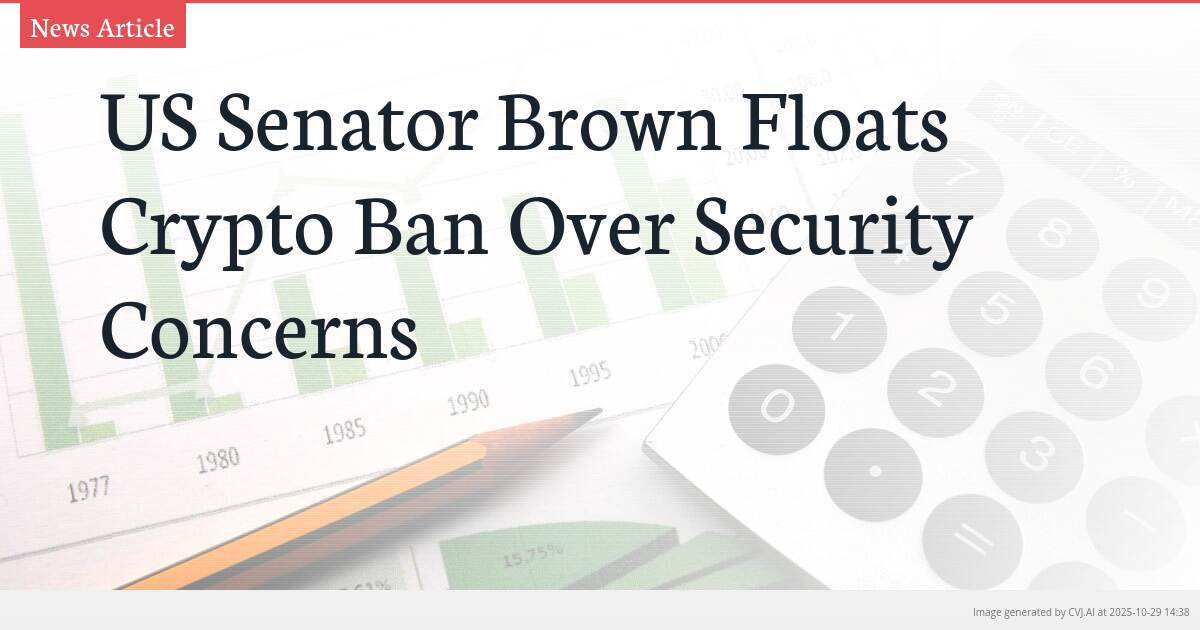This summary text is fully AI-generated and may therefore contain errors or be incomplete.
Introduction
U.S. Senator Sherrod Brown, Chairman of the Senate Banking Committee, has raised the possibility of banning cryptocurrencies, labeling them as ‘dangerous’ and a ‘threat to national security.’ His comments reflect growing regulatory pressure on digital assets following the FTX collapse and highlight deepening political divisions over how to handle the $800 billion crypto market.
Key Points
- Senator Brown specifically cited drug trafficking, North Korean cybercrime, and terror financing as national security threats exacerbated by cryptocurrency use
- The senator acknowledged that banning crypto would be 'very difficult' because it would likely move offshore, creating additional regulatory challenges
- Brown praised U.S. and Bahamian officials for their role in arresting FTX founder Sam Bankman-Fried, connecting the exchange's collapse to broader crypto regulatory concerns
The Case for a Cryptocurrency Ban
Senator Sherrod Brown’s stark warning about cryptocurrencies represents one of the most significant political challenges facing the digital asset industry. As Chairman of the Senate Committee on Banking, Housing, and Urban Affairs, Brown holds considerable influence over financial regulation. In his recent statements, he specifically called on regulatory bodies including the U.S. Treasury, the Securities and Exchange Commission (SEC), and the Commodity Futures Trading Commission (CFTC) to take decisive action, explicitly mentioning that ‘maybe banning’ should be among the options considered.
Brown’s concerns center on what he describes as national security threats exacerbated by cryptocurrency use. He pointed to drug trafficking, North Korean cybercriminal activity, human trafficking, and terror financing as specific problems aggravated by digital assets. ‘This is a complicated, unregulated pot of money,’ Brown stated, emphasizing that cryptocurrencies don’t deserve special treatment ‘because it’s bright and shiny.’ His position reflects a hardening stance among some lawmakers who view crypto as fundamentally incompatible with regulated financial systems.
The Senator did acknowledge practical challenges, noting that banning crypto would be ‘very difficult because it will go offshore and who knows how that will work.’ This recognition of implementation difficulties suggests that while Brown is advocating for strong measures, he understands the complexities of enforcing a comprehensive ban in a borderless digital environment.
Regulatory Pressure Intensifies Post-FTX
The collapse of FTX and subsequent arrest of its founder Sam Bankman-Fried has become a focal point in the regulatory debate. Brown specifically thanked U.S. and Bahamian officials for their role in Bankman-Fried’s arrest, connecting the exchange’s failure to broader concerns about crypto industry practices. The $32 billion collapse has provided ammunition to regulators and lawmakers who argue that the industry requires much stricter oversight.
SEC Chair Gary Gensler has amplified this regulatory pressure, recently stating that crypto exchanges that don’t cooperate with the SEC are ‘operating outside of the law’ and may face enforcement action. This positions the SEC as a key player in the emerging regulatory landscape, with Gensler consistently arguing that most cryptocurrencies qualify as securities subject to existing regulations. The Commodity Futures Trading Commission has also been active in pursuing crypto-related enforcement cases, creating a multi-agency approach to regulation.
Meanwhile, the U.S. Treasury Department is advancing its own oversight efforts, with plans to complete an ‘illicit finance risk assessment’ on decentralized finance (DeFi) and non-fungible tokens (NFTs) in early 2023. This comprehensive review signals that regulatory scrutiny will extend beyond traditional cryptocurrencies to encompass the broader digital asset ecosystem.
Political Divide on Crypto's Future
The debate over cryptocurrency regulation has exposed significant divisions within Congress. Senator Jon Tester, who serves on the same banking committee as Brown, recently stated that he sees ‘no reason why crypto should exist,’ positioning himself as another strong advocate for either banning or heavily regulating digital assets. This sentiment reflects growing skepticism among some lawmakers amid unfavorable market conditions and high-profile industry failures.
However, not all political voices support restrictive measures. Senator Tom Emmer has emerged as a vocal opponent of what he characterizes as ‘crippling regulation,’ arguing that excessive oversight would harm industry innovation in the United States and cause the country to lose its market dominance worldwide. Emmer’s position represents a significant counterpoint to Brown’s approach, highlighting the fundamental tension between consumer protection and technological innovation.
This political split reflects broader uncertainty about how to classify and regulate digital assets. As Brown noted, ‘If crypto acts like a security, commodity, or bank account, then it needs to be regulated as such.’ This framing suggests that the regulatory approach may ultimately depend on how different cryptocurrencies are categorized, rather than applying a one-size-fits-all solution to the diverse digital asset landscape.
📎 Read the original article on coincodecap.com

